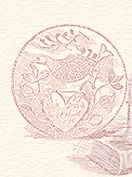Ihr liewe Leit:
Daarrich es Yaahr 1999 warre mer efders Linye aussem "Unser Pennsylvaanisch-Deitscher Kallenner" (UPDK) lese. Der Kallenner waar vum Henry A. Schuler, "Der Kallennermann," (1850-1908) gschriwwe un waar 1905 in Allentown gedruckt warre.
Der aerscht Satz fer der Yenner lest "Der Yenner iss der aerscht Munet, weil's Yaahr mit aafangt." Sell, glaawwich, iss en guder Aafang, schiergaar besser ass gut!
Awwer dann schreibt der Schuler ebbes ass uns indressiere kennt: "Es Neiyaahrschiesse iss en alder Gebrauch wu noch viel uffghalde watt do rum. Ver alders hot sich en Paerdi uffgernacht, hen die Flinde gelaade, un sin vun Haus zu Haus gange fer die Leit es Neiyaahr aazuwinsche. Eener hot als en langer Wunsch auswennich gsaat, un warm er faddich waar, henn sie es gnalle losse.
"Noh henn die Leit.die Neiyaahrschitz ins Haus kummelose, un henn sie getriedt mit Ebbel, Kuche, Woi un n so Dings. Sell Neiyaahraawinsche waar schee, awwer `s iss gans aus Faeschen nau."
Awwer wie hot so en Neiyaahrwunsch gelaudt? In seim Buch "Am Schwatze Baer" gebt uns der Lloyd Moll en iwweraus gudes Beischpiel:
Ich winsch eich in dem Haus
All's Glick in daere Welt,
Mit Gsundheet macht's nix aus
Wie reich reich du bischt mit Geld.
Ken Grankheet soll dich lege,
Ken Schmaerze sollscht du leide,
Un Druwwel, do lach dewege;
Fer dich sin lauder Freide.
Dei Beem mit Obscht gelaade,
Die Nescht sin gans geboge,
Dei Graut brauscht net abblaade,
Die Keffer sin all verfloge.
Dei Frichde uffem Feld,
Die schtehne all so dick,
Dei Aernt bring dir viel Geld,
Mei Wunsch, en groosses Glick.
Dei Kieh die gewwe Budder
In Glumbe goldegeel;
`S iss yedes Kalb' en Mudder
Un des iss unne Fehl;
Dei Sei, die solle waxe
Viel heecher wie die Benne;
Dei Hinkel immer gaxe,
So dass sie lege kenne.
Mer sin noch net faddich mit dem do Wunsch. Un wann mer neegscht Woch weidermache, warre mer ausfinne wie en Neiyaahrwunsch laudt wann die Winscher net viel geliebt sin.
Un nau winscht der alt Professer eich all en glicklich neies Yaar!
Macht's gut, ihr liewe Leser
Der Alt Professer
|
Dear people:
Throughout the year 1999 we will often read lines from "Our PennsylvaniaGerman Almanac" (OPGA). The almanac was written by Henry A. Schuler, "The Almanac Man" (18501908), and was printed in Allentown in 1905.
The first sentence for January reads "January is the first month, because the year starts with it." That, I believe, is a good beginning—almost better than good!
But then Schuler writes something that could interest us: "Shooting in the new year is an old cus torn that is still kept up around here. Years ago a party *would be made up, the rifles were loaded, and they went from house to house to wish in the new year for the people. One of them would say a long wish by heart, and when he was finished, they let go a shot.
"Then the people let the shooters come into the house and treated them with apples, cake, wine and such things. That kind of wishing in the new year was nice, but it is now entirely out of fashion."
But how did such a new year's wish sound? In his book, "At the Black Bear," Lloyd Moll (1879-1944) gives us an especially good example:
I wish you in this house
All the happiness in the world,
With health it makes no difference
How rich you are with money.
No sickness shall fell you,
No pain shall you endure,
And trouble, just laugh about it;
For you are only joys.
Your trees loaded with fruit,
The branches are all bent down,
Your cabbage you needn't deleaf,
The bugs have all flown off.
Your grain in the fields,
It. stands all so thick,
The harvest brings you much money,
My wish, great happiness (luck).
Your cows, they give butter
In clumps golden yellow;
Every calf is a mother
And that's without fail;
Your pigs they shall grow
Much hgiher than their pens;
Your hens always cackle,
So that they can lay.
We are not yet finished with this wish. And when we continue next week, we will find out how a new year's wish sounds when the wishers are not liked.
And now the old Professor wishes you all a happy new year!
Take care, dear readers.
The Old Professor
|













